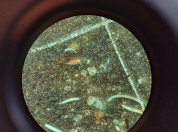Droevendaalsesteeg 10
6708 PB Wageningen
The Netherlands
Towards a more sustainable agricultural production system, I am a microbial ecologist researching soil microbes associated with greenhouse gas emissions and investigating how ecological stoichiometry drives biogeochemical cycles in agricultural soil.
I started my academic journey by pursuing a Bachelor's degree in Biology at Illinois Wesleyan University in the US. After two years, I transitioned to the Bachelor's program in Earth and Environmental Sciences at Jacobs University Bremen in Germany. For my bachelor's thesis, I delved into marine biogeochemistry at the Alfred-Wegener-Institute (AWI), focusing on boron isotopic compositions of planktonic foraminifera as a tracer of past ocean pH. I completed my Master's degree in Applied Environmental and Geoscience at the University of Tübingen, specializing in geomicrobiology. My Master's thesis explored iron biogeochemical cycling as a key driver for soil microbial activities across a climatic gradient.
I am currently immersed in my doctoral studies as a PhD student at NIOO-KNAW, contributing to the SoilProS project. SoilProS project aims to utilize biodiversity data and machine-learning models to assist farmers in predicting optimal agricultural management practices, thereby enhancing soil multifunctionality and sustainability. My research interests lie in the mitigation of soil greenhouse gas (GHG) emissions and soil nitrogen leaching. I am particularly intrigued by the effect of the ecological stoichiometry of nutrients, substrates, and trace metals in agricultural amendments on GHG-associated microbial communities and corresponding soil GHG fluxes.
